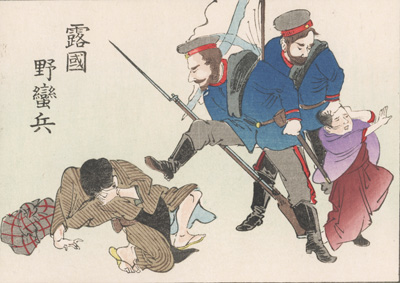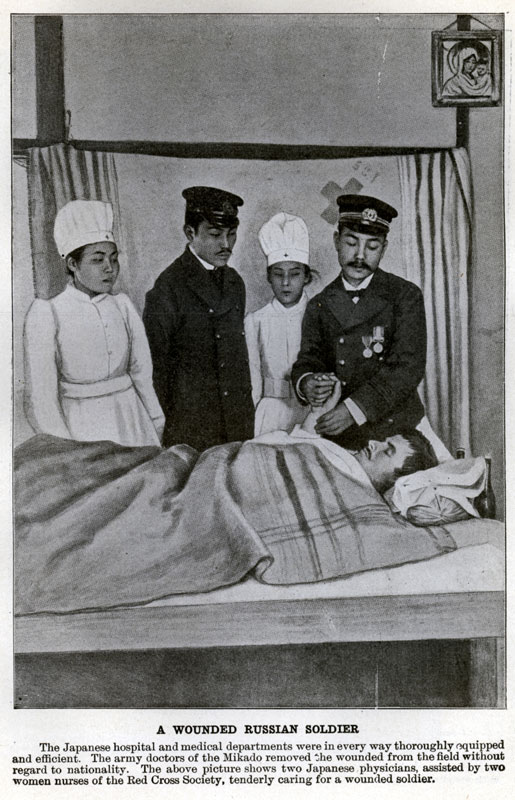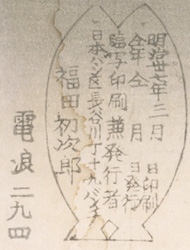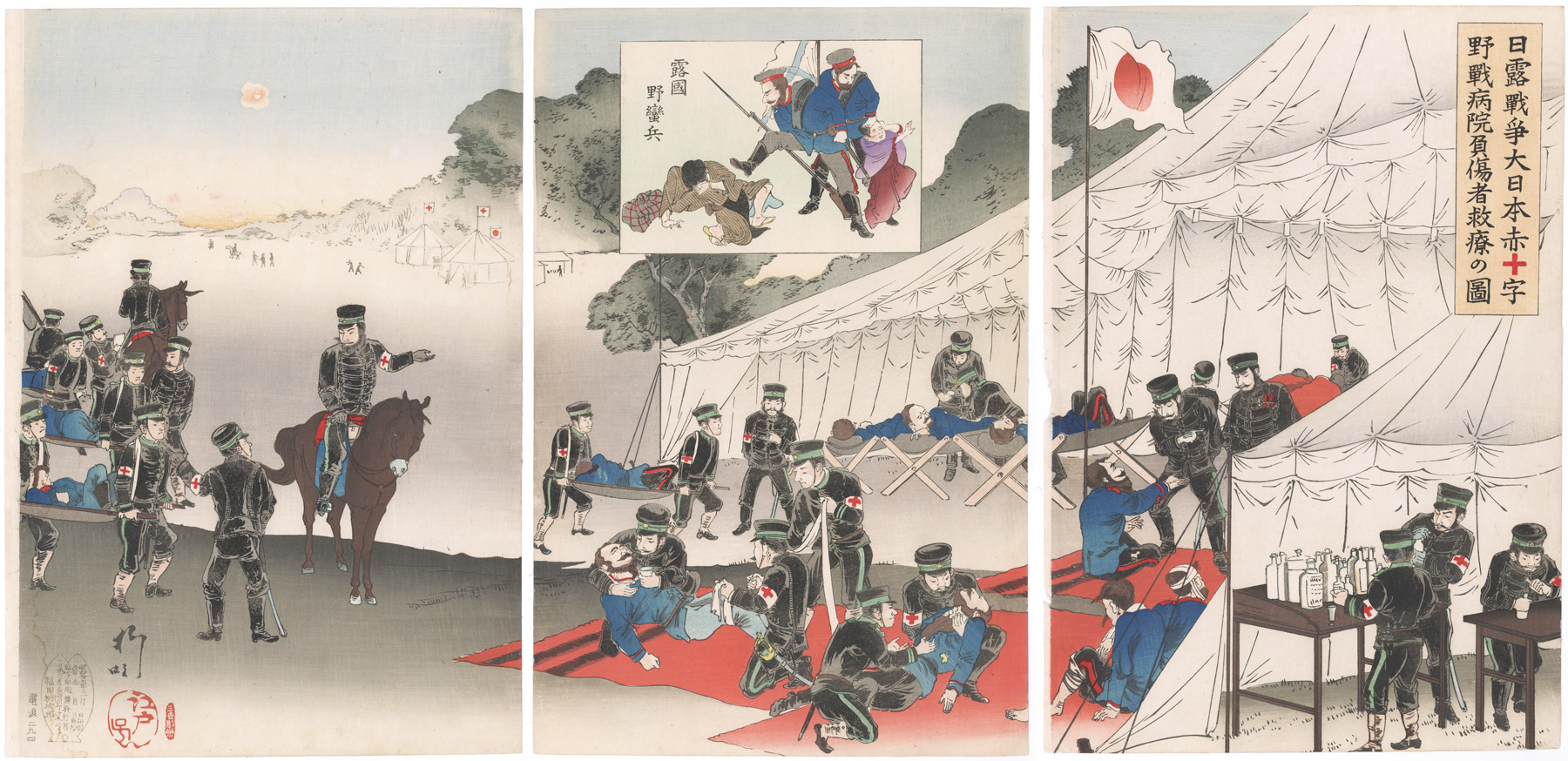About This Print
Source: A Much Recorded War: The Russo-Japanese War in History and Imagery, Fredrick A. Sharf, Anne Nishimura Morse, Sebastian Dobson, MFA Publications, 2005, p. 44.
As part of Japan's efforts to emulate Western institutions, the Japanese Red Cross was established in 1877, during the Seinan War (a.k.a. Satsuma Rebellion). By the time of the Sino-Japanese War [1894-1895], images of the Red Cross tending to fallen soldiers had become part of the standard iconography of the battlefield; the Japanese were to be seen as not only mighty but also magnanimous, as befitted an "enlightened" nation. Such descriptions would only proliferate during the Russo-Japanese War, with the Japanese Red Cross shown selflessly caring for Japanese and Russian wounded alike. (For another print depicting the Japanese Red Cross in action on the battlefield see IHL Cat. #104 The Humane Ambulance Corps of the Japanese Red Cross.)
As part of Japan's efforts to emulate Western institutions, the Japanese Red Cross was established in 1877, during the Seinan War (a.k.a. Satsuma Rebellion). By the time of the Sino-Japanese War [1894-1895], images of the Red Cross tending to fallen soldiers had become part of the standard iconography of the battlefield; the Japanese were to be seen as not only mighty but also magnanimous, as befitted an "enlightened" nation. Such descriptions would only proliferate during the Russo-Japanese War, with the Japanese Red Cross shown selflessly caring for Japanese and Russian wounded alike. (For another print depicting the Japanese Red Cross in action on the battlefield see IHL Cat. #104 The Humane Ambulance Corps of the Japanese Red Cross.)
A later state of this print added an English transcription, written in cursive, to the upper left hand corner of the left sheet that reads "Japan Red Society Hospital treating the wounded in the Russo-Japanese war."

The inset, shown above, of the center sheet of this print reads "brutal Russian soldiers" 露國野蠻兵 who are seen tearing a child away from its mother. This inset leaves no doubt about who were the "bad guys and good guys" during the war, but as we know brutality towards the civilian population was practiced by both sides.
The Japanese Red Cross
Source: Wikipedia http://en.wikipedia.org/wiki/Japanese_Red_Cross
From the beginning, the Japanese royal family, especially Empress Shōken, provided active support for Red Cross activities. (See this collection's prints Picture of a Visit by the Empress to the General Staff Headquarters and Illustration of the Japanese Red Cross Society General Meeting.) During the Russo-Japanese War (1904-1905), the Japanese Red Cross played an outstanding role rescuing many Russian prisoners of war, gaining Japan a considerable amount of good public relations in the western press.

Source: Official History of the Russian-Japanese War: A Vivid Panorama of Land and Naval Battles, J. Martin Miller, 1905
Print Details
| IHL Catalog | #1676 |
| Title (Description) | Russo-Japanese War: Great Japan Red Cross Battlefield Hospital Treating Injured 日露戰爭大日本赤十字野戰病院負傷者救療の圖 Nichiro sensō dai Nihon Sekijūji yasenbyōin fushōsha kyūryō no zu |
| Artist | Utagawa Kokunimasa 小国政 (1874 – 1944) |
| Signature |  |
| Seal |  |
| Pub. Date | March 1904 (Meiji 37) as shown on publisher's seal below |
| Publisher |  Fukuda Hatsujirō (福田初次郎) located at Tokyo Nihonbashi Hasegawachō 19-banchi (日本橋区長谷川丁十九バンチ) [Marks: seal 30-062; pub. ref. 070] 臨写印刷兼発行者 Rinsha insatsu ken hakkōsha The characters 電浪 二九四 appearing to the left of the seal are likely the publisher's phone number, although "telephone" is normally seen as 電話 ("denwa") instead of 電浪 ("denrō") as written here. |
| Carver |  |
| Impression | excellent |
| Colors | excellent |
| Condition | good - 3/4" paper loss center of left margin on right sheet, some paper remnants verso; some margin trimming |
| Genre | nishiki-e; senso-e (Russo-Japanese War) |
| Miscellaneous | |
| Format | vertical oban triptych |
| H x W Paper | R:14 x 9 9/16 in. (35.6 x 24.3 cm) C: 14 x 9 3/16 in. (35.6 x 22.9 cm) L: 13 15/16 x 9 5/8 in. (35.4 x 24.4) |
| H x W Image | R: 14 x 9 7/16 in. (35.6 x 24 cm) C: 14 x 9 3/16 in. (35.6 x 23.3 cm) L: 13 15/16 x 9 3/8 in. (35.4 x 23.8 cm) |
| Literature | A Much Recorded War: The Russo-Japanese War in History and Imagery, Fredrick A. Sharf, Anne Nishimura Morse, Sebastian Dobson, MFA Publications, 2005, p. 44; The Male Journey in Japanese Prints, Roger Keyes, The Fine Arts Museum of San Francisco and The University of California Press, 1989, p. 110, fig. 159.; Conflicts of Interest: Art and War in Modern Japan, Philip K. Hu, et. al., Saint Louis Museum of Art, 2016, p. 234, pl. 107. |
| Collections This Print | Museum of Fine Arts, Boston 2000.367a-c; Noda Public Library c27; Digital Collections Keio University Libraries; Saint Louis Museum of Art 423:2010a-c |
4/15/2020
3/30/2020


